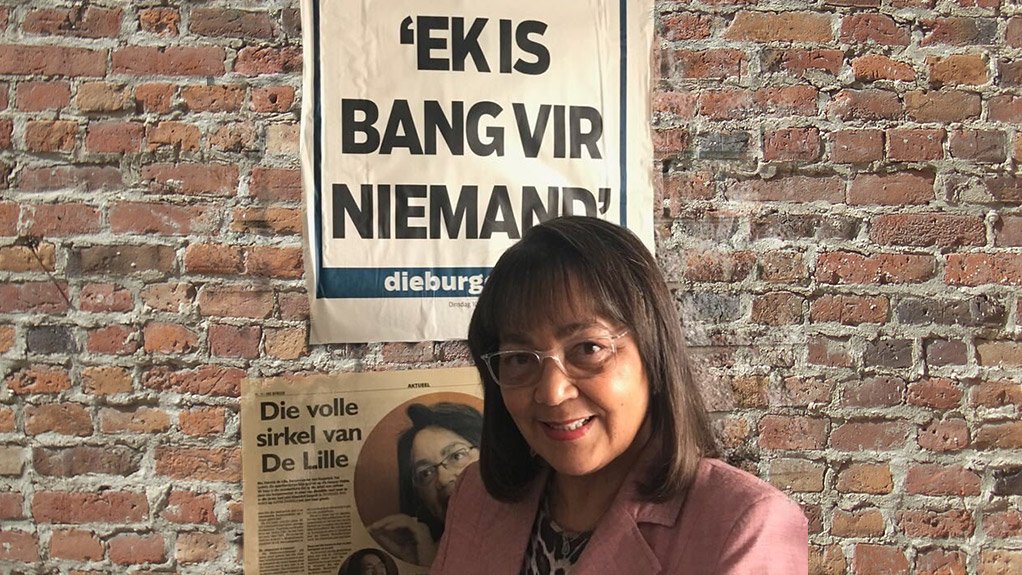Patricia de Lille's removal from the Democratic Alliance (DA) for comments made on radio was a "total overreaction" akin to "killing a fly with a hammer", the Western Cape High Court has heard.
The Cape Town mayor's lawyers had all of Tuesday to make her case in court in her bid to have the DA's decision to strip her of her party membership reviewed and set aside.
The party's decision was based on the comments she had made in a radio interview in late April.
Dali Mpofu, SC led the charge during the morning session and Johan de Waal, SC picked up the baton after the lunch adjournment. Sean Rosenberg, SC, for the DA, is expected to argue the party's case on Tuesday.
In the afternoon session, De Waal criticised the DA's taking of a decision, which had such large-scale implications for both De Lille and the City of Cape Town, over comments she had made on a radio station, that in themselves were open to interpretation.
"When it comes to [legal] reasonableness, here we are dealing with a decision that is totally disproportionate. Reasonableness requires an element of proportionality between what she did, and the sanction.
"Really, the crux of the unfairness lies therein."
Even if De Lille had meant she would resign from the party upon clearing her name, as is suggested, it was a "total overreaction" to kick her out of the party, the council and the mayoral office immediately, based on the conditional words used, he said.
"It is a total textbook example of the hammer that is used to kill the fly."
The cessation clause was problematic as it didn't necessarily require harm on those uttering it, but the consequences thereof were great, he said.
DA 'can't explain differences' between De Lille's words and others'
De Waal cited other incidents where DA members had shared similar, conditional statements where they said they would resign, but were never determined to have done so through the party's cessation clause.
An incident involving MP Phumzile van Damme, published in an Afrikaans media report, quoted Van Damme as saying during a caucus meeting, that she would resign "unless the party had the courage to express itself honestly about white privilege and black poverty", De Waal read.
He asked the court what the difference was between that "clearly conditional statement" and De Lille's during the Radio 702 interview.
The judges, however, raised the point that Van Damme reportedly made the comments during a caucus meeting, which was not the same as declaring it publicly.
Nonetheless, the comments still made its way into the public domain, De Waal tried to counter.
In any case, his point was that the DA "can't explain the difference" between De Lille's public statement versus Van Damme's, he said.
Other members, including DA leader Mmusi Maimane, had made similar conditional statements that made it to print media and they were always taken to be conditional, he argued.
Processes questioned
On the process side, De Waal argued that the 24 hours given to De Lille to make representations on her ceased membership was not in the interests of natural justice.
He cited case law, including a case involving an African Christian Democratic Party councillor and his party, where the court ruled that 48 hours was not enough time for a person to respond to a disciplinary process.
"What was the urgency? They've been at loggerheads for nine months and then someone serves the papers on her unannounced on a Thursday afternoon and stresses she has 24 hours to resign," De Waal continued.
De Waal also claimed that the DA federal executive meeting that made the final determination against De Lille was simply a "rubber-stamping" exercise.
The party's minutes only showed one line where deputy federal council chairperson Thomas Walters proposed they accept the party's federal legal commission recommendation that De Lille's membership had ceased.
There was no evidence of discussion and that the federal executive applied its mind, he argued.
Judge Mark Sher, however, pointed out that the absence of evidence on party minutes did not mean discussion didn't take place.
De Waal was eventually cut short as the court adjourned for the day. He will have 30 more minutes on Tuesday to argue on De Lille's behalf.
Thereafter, Rosenberg will have the floor to argue the merits of the DA's case.
Earlier in the day, Mpofu argued that De Lille's ousting was unconstitutional, inconsistent and in bad faith, and that the DA was "trying to have it both ways" when it came to removing her.
EMAIL THIS ARTICLE SAVE THIS ARTICLE
To subscribe email subscriptions@creamermedia.co.za or click here
To advertise email advertising@creamermedia.co.za or click here











